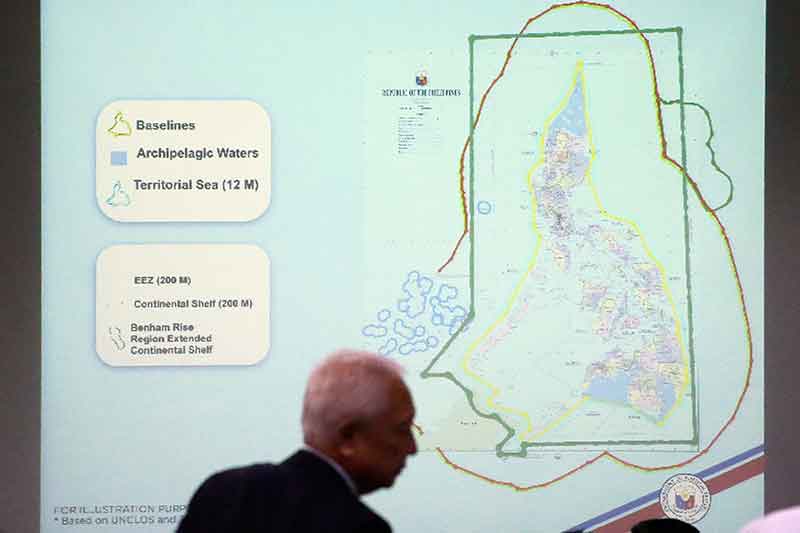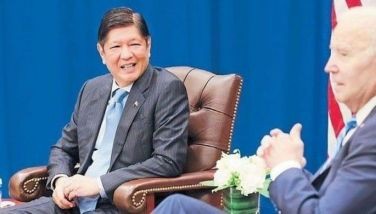Philippines hosts ASEAN-China seminar on South China Sea

A man walks past a map of the Philippines and it's archipelagic waters during a budget meeting in Manila, Philippines on Tuesday, Aug. 22, 2017. Two Filipino security officials say China has deployed its navy and coast guard ships in a cluster of uninhabited sandbars in the disputed South China Sea amid concerns that the Philippines may build structures on them in an emerging territorial issue that the government stated was quickly resolved. The Chinese presence sparked concerns in Manila but Philippine Foreign Affairs Secretary Alan Peter Cayetano said without elaborating that the issue has been resolved. AP/Aaron Favila
MANILA, Philippines — Senior diplomats, policymakers and maritime cooperation scholars from members states of the Association of Southeast Asian Nations and China will meet in Manila to exchange views on the South China Sea.
The Department of Foreign Affairs (DFA) announced that the meeting in Manila this week seeks to enhance practical cooperation between the regional bloc and China in the disputed waters.
"The seminar seeks to build on what we have achieved so far in our efforts to build trust and confidence among the parties involved in the South China Sea issue," DFA Secretary Alan Peter Cayetano said.
The seminar on the full and effective implementation of the 2002 Declaration of Conduct of Parties in the South China Sea (DOC) will be held on August 28 and 29.
The Philippines' top diplomat stressed that the seminar highlights the commitment of the Philippines to implement the DOC while working on an effective code of conduct.
"The seminar also seeks to boost regional efforts to ensure peace and stability in the South China Sea, to help prevent maritime accidents, and to preserve and protect the marine environment and promote sustainable fisheries," Cayetano added.
First seminar was in 2015
The DFA first hosted a South China Sea seminar in 2015 which focused on the discussions on peaceful settlement of disputes and what constitutes self-restraint on activities of claimant states in the contested waters.
Paragraph 5 of the DOC calls on all parties to the dispute to “exercise self-restraint in the conduct of activities that would complicate or escalate disputes and affect peace and stability."
Earlier this month, the foreign ministers of the ASEAN released a joint communique emphasizing the importance of non-militarization and self-restraint the conduct of activities in the South China Sea.
Chinese Foreign Minister Wang Yi, meanwhile, said that there would be a precondition for the official start of the negotiations on the code of conduct.
“When the situation in the South China Sea is generally stable, if there is no major disruption from outside parties,” Wang said, referring to the United States. — Patricia Lourdes Viray
READ: ASEAN stresses self-restraint, non-militarization in South China Sea
- Latest
- Trending































